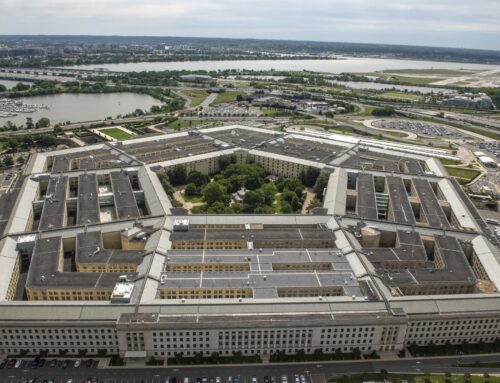In the 1950s and 60s, there was a television show called “I’ve Got a Secret.” Host Garry Moore welcomed guests who had a “secret.” Four panelists would then have a timed round of questions to attempt to discover the secret. If they were unsuccessful, the secret keeper went home with a cash prize.
This popular show was a fun diversion for Cold War America. Unfortunately, there’s a new secret game being played in Washington. This time, the United States Air Force is the secret keeper and American taxpayers are being asked to shell out the cash.
The Air Force is in the early stages of purchasing its next long-range bomber aircraft – a huge and expensive undertaking. In recent months, the winning contractor was announced: Northrop Grumman, the plane was designated as the B-21, and we have just learned its catchy nickname – the “Raider.” But what’s really important is how much the Air Force will pay Northrop Grumman to produce the plane – and that’s where the “secret” comes in.
The Air Force, presumably backed by higher-ups in the Pentagon, is refusing to release the overall contract value or total program cost for the B-21. Officials argue that publicizing those numbers would give too much information to our adversaries. But this decision stands decades of weapons procurement policy on its head. Longstanding practice in the Pentagon is to develop programs either in the “open” or in the “black.” Highly classified, or “black” programs, are developed without being publicly acknowledged.
But the B-21 isn’t a “black” program and many of its details have already been publicly released, including an artist’s rendition showing its shape and relative size. The secrecy has baffled Senator John McCain (R-AZ), chairman of the Armed Services Committee. He had this exchange with the nominee to be the top General in the Air Force:
.jpg) |
| Artist rendering of the B-21 – U.S. Air Force |
“Chairman McCain: Thank you, General. On the issue of the B-21 bomber, do you know what the Independent cost estimate associated with the winning bid was, roughly? Is it $23.5 billion?
“General David L. Goldfein: Yes, sir. That is the independent cost estimate.
“Chairman McCain: And the aircraft per unit cost associated with the winning bid was about $556 million. Is that correct?
“General Goldfein: Yes, sir. That is correct.
“Chairman McCain: And the Air Force budget request as developed is about $1.36 billion. Is that right?
“General Goldfein: Yes, sir.
“Chairman McCain: The Air Force released an artist conception of the B-21?
“General Goldfein: Yes, sir.
“Chairman McCain: The Air Force released the top tier suppliers for the B-21?
“General Goldfein: Yes, sir.
“Chairman McCain: I am having a difficult time understanding how the public disclosure of a single contract award value funded from an unclassified budget request is going to give the enemy more information on the capabilities of a new bomber than what the Air Force has already disclosed. All I can see is that keeping it a secret deprives the American taxpayer of the transparency and accountability they deserve.
.png) |
| Sen. John McCain (R-AZ), Chairman of the Armed Services Committee, questioning General Goldfein. |
“Can you explain what new information our enemies might learn from the release of the contract award value that they could not learn from the information the Air Force has already released?
“General Goldfein: Yes, sir. And, Chairman, I agree with you, and I believe that if we are not transparent with the American people on the cost of this weapon system, through its elected leadership, then we have a good chance of losing this program.”
So, what gives? If the new Air Force Chief of staff believes the cost of the B-21 should be disclosed, why, exactly, is it being kept secret?
In an effort to pry loose the cost information, McCain’s armed services panel produced a draft Fiscal Year 2017 Pentagon policy bill requiring the Air Force to disclose the full contract award value. But a senior Democrat on the committee, Senator Bill Nelson of Florida, offered an amendment to strip that requirement. It passed with bipartisan support.
Unfortunately, the Air Force has a long history of low-balling or just getting wrong estimates of how much its aircraft programs will cost. For instance, just in the last 30 years, the Air Force has underestimated the unit cost of the B-2 by 465%, the F-22 by 205%, and the F-35 by 68% (so far). That’s a dreadfully poor track record.
We believe the Air Force refuses to release the projected cost of the B-21 because officials don’t want taxpayers to know how many hundreds of billions of dollars it will cost to sustain this system for the next 40-50 years. (Hint: The most recent Government Accountability Office estimate of the sustainment cost of the F-35 is $1.3 trillion dollars.) And Air Force officials also don’t want to eat more humble pie when the cost estimate once again balloons.
But unlike the old “I’ve Got a Secret” television show, which awarded guests $80 and a carton of cigarettes if they fooled the panelists, the Air Force will get a much bigger cash prize if it continues to fool the Congress into supporting this secrecy. Multiple that $80 by a billion, and you may be getting warm.
For refusing to release the overall costs of the B-21 bomber program, the United States Air Force receives our “Golden Fleece” award.
About the Golden Fleece Award
From surfing subsidies to the Great Wall of Bedford, Indiana, Wisconsin Senator William Proxmire’s Golden Fleece Award protected taxpayers…and made them laugh! One of the most popular and enduring icons of American politics, Senator Proxmire’s Golden Fleece Award embodied both outrage and humor as it put the public spotlight on waste and abuse of taxpayer money. To commemorate the 25th anniversary of the famous waste-busting award, Senator Proxmire asked Taxpayers for Common Sense (TCS) to revive the Golden Fleece Award in 2000.
For more information, contact Taxpayers for Common Sense at 202-546-8500 ext. 132












Get Social